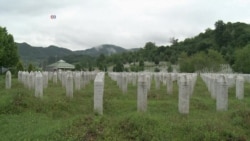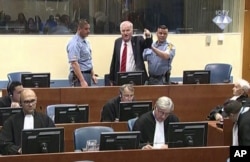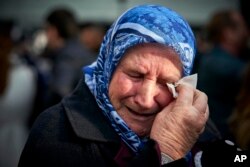Ratko Mladic, the former general in charge of Bosnian Serb forces during the Balkans war in the early 1990s has been convicted of 10 charges of genocide, crimes against humanity and war crimes at an international tribunal in The Hague. He was jailed for life.
In cold detail, the presiding judge, Alphons Orie, spelled out the crimes Mladic masterminded during the Bosnian war.
“On 13 and 14 July 1995, approximately 1,000 unarmed Bosnian and Muslim males including children and elderly were executed in Kravica Warehouse. On 16 July 1995 between 1,000 and 1,200 in the Branjevo military farm were summarily executed.”
And so the list went on.
The so-called “butcher of Bosnia” was led away from the dock before the verdicts were announced, after shouting at the judge, “It's a lie. Everything you said in this courtroom is a lie.”
Ratko Mladic led Bosnian Serbian forces during the 1992-1995 Bosnian war. He oversaw the siege of Sarajevo, where snipers and heavy artillery pounded the city and cut off supplies, killing thousands.
Judges also found that Mladic had, in their words, “significantly contributed” to the massacre at Srebrenica, when more than 7,000 Muslim men and boys were murdered.
For the victims’ relatives, the verdict offered some closure. Nedžiba Salihović lost her husband in the Srebrenica massacre in 1995. She spoke to VOA after the verdict was delivered.
“My husband was 42 when they separated him. He was carrying our 8-month old grandson in his arms. They took the baby away from my husband’s arms. My grandson is now 22 and he comes to his father’s grave and prays. Today, I am so happy regardless of the sorrow and pain I felt in 1995. I am more than happy today indeed,” Salihović said.
The Mladic verdict follows the conviction of the former Republika Srpska president Radovan Karadzic in 2016. The trials are widely seen as a victory for international justice.
Kosovo welcomed the conviction of Mladic. Kosovo’s Foreign Ministry said the verdict marked an act of “international justice and satisfaction for the Bosnia war victims.”
As did Bosnia.
“The people of Bosnia feel that justice has been done. To a certain extent now we’ve closed the loop on the grossest mass murder in Europe since the Second World War. However, sadly justice is not the glue that is likely to put that divided country together,” said Jonathan Eyal of London’s Royal United Services Institute.
A divided nation
Bosnia remains a divided country. In the largely autonomous region of Republika Srpska, ethnic Serbs have expressed support for Ratko Mladic, and claim he is innocent.
Serbia’s President Aleksandr Vucic, a former nationalist who supported Mladic's war campaigns, said Wednesday he was unsurprised by the verdict.
“All those who want to return to the past, I wish them farewell. We want to go to the future. We are capable of accepting our responsibility, I am afraid that many others are not,” he said.
Belgrade wants to consign the conflict to history, Eyal said.
“Ratko Mladic does not represent the new Serbia," he said. “There’s no one under the age of 25 in Serbia who would look up to this criminal as a symbol of the country. So, for an older generation he will continue to have a certain appeal. For the future of Serbia, which wants to be part of the European Union, he’s a nobody.”
Ratko Mladic’s lawyer says he plans to appeal the verdict. Analysts say the conviction is not likely to be overturned.







